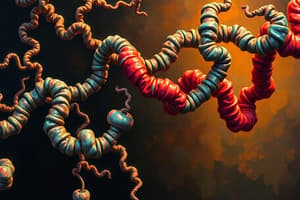Podcast
Questions and Answers
Which enzyme is responsible for catalyzing the formation and breakage of disulfide bonds in proteins?
Which enzyme is responsible for catalyzing the formation and breakage of disulfide bonds in proteins?
- Protease
- Prolyl cis-trans isomerase (PPI)
- Ligase
- Protein disulfide isomerase (PDI) (correct)
What is the role of prolyl cis-trans isomerase (PPI) in protein folding?
What is the role of prolyl cis-trans isomerase (PPI) in protein folding?
- PPI helps in the formation of disulfide bonds
- PPI catalyzes the folding of proteins
- PPI stabilizes the tertiary structure of proteins
- PPI assists in the correct folding of proline residues (correct)
Which techniques can be used to determine protein structure?
Which techniques can be used to determine protein structure?
- PCR and gel electrophoresis
- X-ray crystallography, NMR, and cryo-electron microscopy (correct)
- Western blotting and immunohistochemistry
- Mass spectrometry and chromatography
Which of the following is an advantage of carbon as a basis for living systems?
Which of the following is an advantage of carbon as a basis for living systems?
Why is silicon not a good substitute for carbon in biological systems?
Why is silicon not a good substitute for carbon in biological systems?
Which of the following is true about prokaryotic and eukaryotic cells?
Which of the following is true about prokaryotic and eukaryotic cells?
Which of the following is true about water as a solvent?
Which of the following is true about water as a solvent?
Why is ammonia not a good substitute for water as a solvent?
Why is ammonia not a good substitute for water as a solvent?
What is the nature of hydrogen bonds in water?
What is the nature of hydrogen bonds in water?
How do polar and nonpolar molecules interact with water?
How do polar and nonpolar molecules interact with water?
Flashcards are hidden until you start studying




